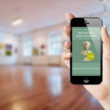Beacon Technology: Using It to Enrich the Museum Patron Experience
4069 Views
![]()
Beacon technology is steadily becoming “the norm” among museums and attractions in order to engage their visitors and attract more customers throughout the year. Museums are in direct competition with technology; therefore, beacon technology ties right into this space. It is first important to understand this technology.
What is Beacon Technology?
Beacons are small devices that are basically tiny computers. They can be placed almost anywhere inside or outside. When a person comes into a beacon’s proximity (which is from 5 to 150 feet) the beacon connects and sends information to his or her smartphone. Companies use beacons to accomplish a variety of goals, from enticing customers to enter their establishments, to apprising them of information and promotions, to creating helpful surveys and fun games, and more. The retail industry was the first to welcome beacon technology and location intelligence. However, museums and other attractions are quickly realizing how they can dramatically benefit from this technology in expanding stronger customer interactions and attracting and delighting more visitors.
There are several ways that museums can utilize this technology to both enrich and enhance the patron experience.
One way beacon technology works to improve the patron experience is it eliminates the “nasty headphone” frustrations. Using traditional headphones supplied by a museum is a pain. They can be expensive and difficult to maintain. Who wants to be grossed out by using headphones that a thousand other people have worn? That is NOT a sublimely happy customer experience. Beacon technology leverages patrons’ favorite thing: his or her cell phone. “Pings” from the beacon hit the guests’ smart phones, and they can interact with the information, click for more in-depth stories and history, and listen to songs or anything else that is relevant to the exhibit. Instead of fighting with old, outdated headphones, visitors are able to connect with the museum’s offerings and enjoy a smooth experience with a trusted piece of equipment they know how to use, their phone or tablet!
Another way beacon technology is key in maximizing the overall experience is it provides visitors a way to experience museums at their own pace. It’s a fact that not every patron is going to enjoy every exhibit. By using beacons with their exhibits, museums allow visitors the ability to control their time and experience it at their own pace, spend more time on the sections that interest them and less on the ones that don’t. There is no waiting for a recording to stop explaining an exhibit that holds no interest in order to move on. When a visitor moves away from one beacon and in proximity to the next, the second one picks up and continues the museum’s story. This customizes the user experience so the museum goer is happy and satisfied with their time spent there. Beacon Technology also offers the museum a look into what exhibits experience the most traffic and longest pauses, and which others may not be as popular.
While museums are a physical space with set restrictions, the digital world doesn’t have that problem. Because there are not limitations, beacon technology offers “behind the scenes” exhibit information. Visitors can access additional information, fun stories, great music, and other relevant information tied to an exhibit, right on their smartphones. This is courtesy of beacon technology. Museum planners can create interesting information that could otherwise not be shared with their visitors due to space issues, and add it to their exhibit via the beacons. This extra information and insight enriches the customer experience and transforms the visit into a more powerful, three-dimensional adventure.
Today’s museums are faced with far more competition for peoples’ time and money than ever before. Millennials especially are a challenging segment of the population to attract and engage, and trying to tear them away from their smartphones is a futile endeavor. Beacon technology in museums is a catalyst toward building a modern, exciting customer experience using the physical and digital space. The benefits bring about a great return on investment in terms of more visitors, more dollars spent per visitor, and an increase in repeat visits.

